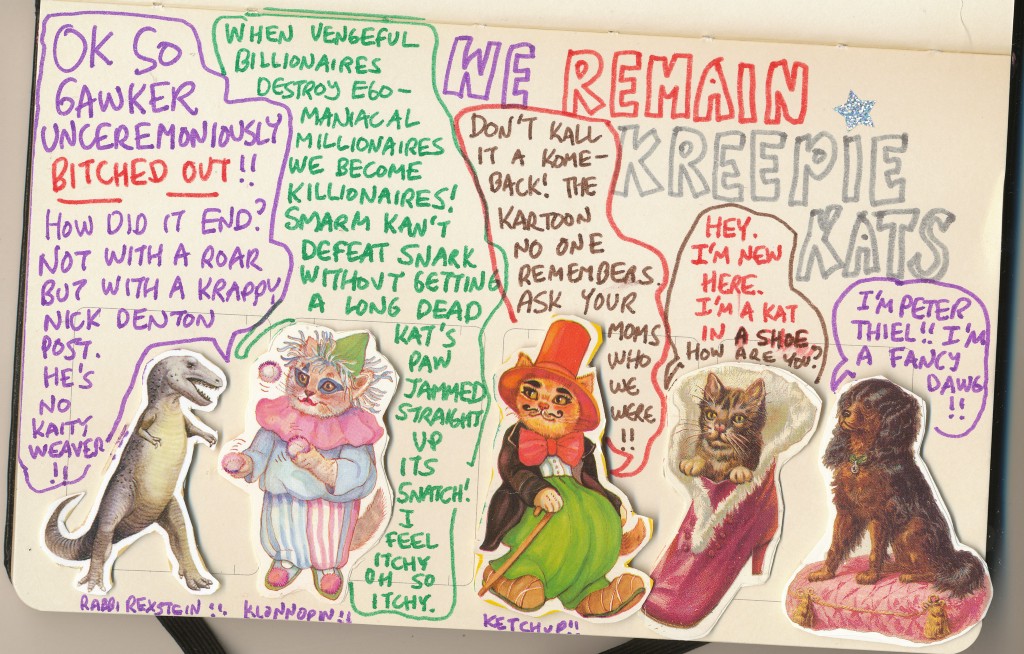New York City, August 24, 2016

★★★ It was hot again if one was moving hastily, trying to hurry children out the door. A woman stopped and dangled one sandal from her toes, trying to shake out something from the corky footbed. The blast of cold air where the line for the bakery began to go down the steps was more dismaying than the rapid warming and thickening of the air outside was. A banana truck blasted its horn on a residential cross street at another truck dawdling ahead of it. After a few minutes’ examination in the midday sun, the phone was hot when put back inside the pocket. By dinnertime walking was tolerable; the light skimmed over the Lincoln Center plaza and shone through the legs of the stacked chairs awaiting the open-air video showing of the opera. Air-conditioner drip fell like rain on the way out of the restaurant.
Rudy Van Gelder, 1924-2016
And now he’s dead.
It is not very often that you hear the phrase “legendary jazz engineer,” but then there was no one else like Rudy Van Gelder, who has just passed away.
He recorded with legendary artists like John Coltrane, Miles Davis, Thelonious Monk and more and an impressive majority of the Blue Note Records catalog. He was viewed by some as the most important jazz engineer of all time. He also worked with Prestige Records and Savoy Records.
This guy on Twitter is correct:
No non-musician had more influence on literal sound of jazz than Rudy Van Gelder. When we think of jazz, the sound in our head is a RVG LP
And there’s a great piece here.
Here’s the first track from Freddie Hubbard’s debut as leader, a Blue Note classic, Open Sesame, recorded at Van Gelder’s Englewood Cliffs studio over half a century ago.
Here’s the first track from Dexter Gordon’s Dexter Calling, recorded in the same place a year later.
And here, from 1964, is the first track of Blue Mitchell’s The Thing To Do, recorded at, yes, Van Gelder Studio.
Rudy Van Gelder was 91.
The First Rule Of The Emergency Brake Is Do Not Pull The Emergency Brake
Don’t.

By now, you’ve already read the horrifying (or perhaps actually not so horrifying) New York Post story about the bugs unleashed in a subway car yesterday. If you haven’t, please take a moment:
Straphangers go berserk after woman tosses bugs in subway car
Okay look there’s a really important lesson here and it has nothing to do with bugs or even crazy ladies. It has to do with no-common-sense-having idiots. As my colleague Alex Balk put it, “the real ire should be directed at the jackass who pulled the emergency brake here.” This is one hundred precent true. Do you know what’s worse than bugs on the subway for the two-to-four minutes it takes to get from one station to the next? Bugs on the subway for half a fucking hour in the middle of the Manhattan Bridge while you wait for the brakes to be reset so service can resume while other passengers are screaming and crying and peeing and throwing up around you.
Every subway car has instructions for what to do in an emergency, and the literal first one is “Do not pull the emergency cord.” DO NOT PULL THE EMERGENCY CORD!!! If someone is having a heart attack, a baby, an anxiety attack, a fainting spell, a bad day, an aneurysm, a bad breakup, whatever it is, do not pull the cord. In almost every single case, it’s better to get to the next station and get to safety, medical attention, or Xanax. The only time it’s okay to pull the cord, according to the MTA, is
only when the motion of the subway presents an imminent danger to life and limb. Otherwise, do not activate the emergency brake cord, especially in a tunnel. Once the emergency brake cord is pulled, the brakes have to be reset before the train can move again, which reduces the options for dealing with the emergency.
(Emphasis mine because a bridge is basically an uncovered tunnel.)
Now. Please take a moment to review the safety card information in the seat-back pocket in front of you, AKA your laptop. A quick refresher:
- What Happens When You Pull The Emergency Brake On the Subway?
- In Most Subway Emergencies, Don’t Pull The Emergency Brake
- That Emergency Brake in the Train? Don’t Use It
(A story so nice Gothamist wrote it twice.)
‘Emergency Brake’ Name Confuses Many on New York Subways
Thank you, and have a safe ride.
"I'm big and you're small, and there's nothing you can do about it."
Talking kindness with Miss Sophie Klimt, teacher of the first grade.
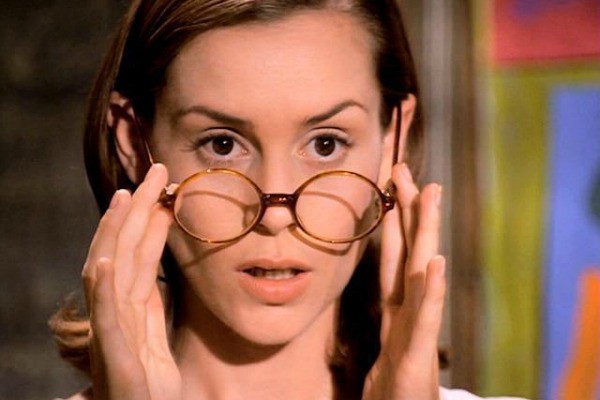
When you imagine a young woman who teaches little kids, what do you see? Do you see an intellectual colossus, or do you see Miss Honey from Matilda? I see Miss Honey from Matilda. She of the “lovely pale oval madonna face,” the face out of which shone “some curious warmth that was almost tangible.”
Primary school teachers, the stereotype goes, are either Trunchbull nasties or longhaired, female believers in kindness. Nice, sweet, kind; not really adult. Sophie Klimt, who teaches year 2 — the British equivalent of first grade — neither voids nor endorses this model. She’s wanted to teach since she was a kid. She used to “teach” her little sister when they were small: “I would set up a little classroom in my bedroom and try to drum history dates into her head.”
Primary school teachers, the stereotype goes, are either Trunchbull nasties or longhaired, female believers in kindness.
When Klimt was seven, something formatively nasty happened to her at school:
My teacher made me stand up in front of the whole class and spitefully asked me to tell the time, despite knowing I couldn’t. “What’s the time, Sophie? What’s the time?” I thought, I will never embarrass anyone like that.
In retrospect, however, Klimt sees that she totally refused to practice time-telling or pay attention in class. What was the teacher supposed to do? Give up? “I’ve been telling this anecdote for nearly my whole life,” she said, “and I’ve only just realized I’m the villain of the piece.”

Nobody can think about primary school teachers without recollecting their own childhood. This struck me as unfair, because, broadly speaking, it reduces the primary school teacher to something like a sense-memory, and that diminishes them as workers. A teacher of college is an enforcer. We may inspire, but only insofar as it helps a student get their money’s worth. Discipline is key. My job is to ram some knowledge through my students’ ears so that they can get a good degree, not to care about the way that they feel.
By contrast, we see the teacher of tiny tots as a kind of surrogate mother, nurturing and coaxing and empathizing with our young. They rear our brood while we get on with our grown up, masculine-coded jobs. The divide between those who work with children and those who don’t gives rise to sexist assumptions about those workers. That divide has only been worsened by the daycare abuse hysteria that winnowed men out of the primary teaching workforce in the 1980s.
But the more I spoke to Klimt about her work, the more I realized that I wanted her to reject the doctrine of “professional kindness” for political reasons around gender, while she wanted to keep it for political reasons around class.

Klimt is highly educated: she has an undergraduate degree in English from Oxford, and she trained to be a teacher at Cambridge. She’s going to start an MA in Children’s Literature at Goldsmiths in the fall. “Sometimes people are surprised that I don’t want to work in a private school,” Klimt told me, “given that I benefited greatly from going to one.”
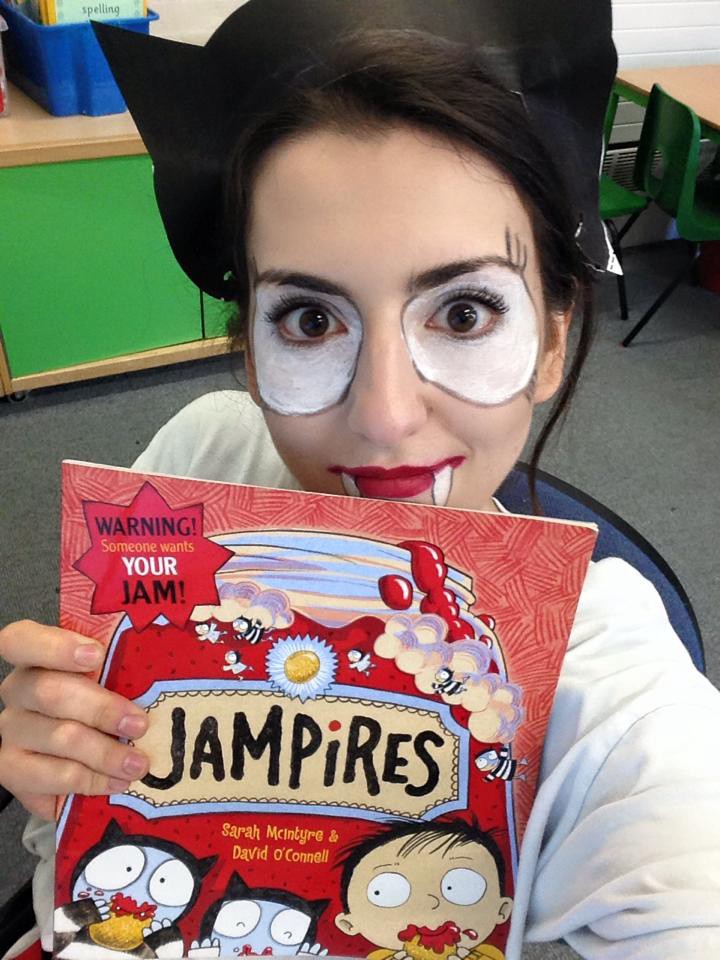
Klimt feels that she was lucky to attend a private school, but also believes that one’s early education is entirely down to luck. There’s “luck if you are born to parents with enough money to pay fees” for private school, and luck if your parents have “the time or inclination (or skills themselves!) to read to you, practise counting with you.” It’s only luck that gives you parents who “even — and this is the most important one — talk to you and engage with you.”
A private school will have more luxurious resources, sure, but Klimt believes that “the teaching is often no better in a private school than a state school.” She belongs in the state education sector, she says, along with everybody else: teachers and children alike.
“I try not to get crazy about it,” Klimt told me, “but I think for the time [my students] are with me they know I care about them, and this makes for a more productive working relationship.” The kindness doctrine is a practical one, and a political one for teachers in the state sector. One’s early life is a crapshoot. A teacher may as well try to even things out as far as she can. Being a good teacher of children means being fair in an unfair world, performing kindness in an unkind one. A good teacher has to be better than a bad system.

During her teacher training, Klimt would take endless notes about other people’s classrooms, “copying down word-for-word their teaching points and describing in lavish detail their displays. . . An enormous beanstalk, with each leaf a different adjective to describe Jack.” She became, as all teachers do, “a Frankensteinian hodgepodge of different teachers” she had seen.
Every teacher is like this. We are all composites of those who have taught us, or colleagues whom we admire. Most importantly, perhaps, we are a composite of the ways that we try to become the person whom our students imagine us to be. It seemed right and true, to me, when Klimt described how teaching “anchors” her:
It gives my weeks, months, years a shape. It makes me strive to be better, kinder, cleverer, more joyous and less selfish. The person I want to be always is the person the children in my class see (unless they’ve ticked me off): responsible, compassionate, giver of tissues, and the brimming font of all knowledge.
That’s exactly what it’s like for me, too, except for giving tissues. I suppose I lend students pens sometimes.
We are all composites of those who have taught us, or colleagues whom we admire.
The vision your students have of you becomes an identity, for any teacher — good or bad. A child’s vision will necessarily be incomplete, and it may even feel limiting to those of us who do not wish to be one-dimensional kindness factories of the kind we read about in children’s books. But we see Miss Honey through Matilda’s eyes, and Matilda is a little kid, even though she’s very smart. Teaching little kids means living up to a partial version of your best self, professionally, every single working day of your life. If you can do it with a “curious warmth,” all the better.
Josephine Livingstone is a writer and academic in New York.
Rhys Ifans, Your Table Is Ready
A Completely Fake Profile Of An Actor, Coming Soon To A Men’s Interest Magazine Near You
“First things first, let’s get the pronunciation out of the way.” I’d barely sat down at the table he’d reserved for us in the back of a Hermosa Beach martini bar’s patio section when it felt like Rhys Ifans (“Reese, like the candy, but you drop the apostrophe-S. Not ‘Rice’ or ‘Rise.’ ‘Reese.’”) was profiling me for a men’s interest magazine with one of the higher circulations in the business. He took a sip from his drink before announcing, self-deprecatingly: “A sheep’s fleece is what you have to think of when you want to say Rhys.”

“That’s a little thing I made up when I was doing the rounds for Nottin’ ‘ill,” he said with a smirk only the great cads can pull off.
Thank God I’d already started my tape recorder.
In skinny jeans and a yellow t-shirt with Japanese characters and a graphic of Bigfoot playing the drums (“Fuck if I know what it means, just thought it looked spot-on” — Lord, he’s right), with aviator sunglasses hanging from the loosened neck only a favorite t-shirt can attain, Ifans percolated cool. His iPhone vibrated next to his half-empty drink, but he flipped it over and put it on the chair next to him, its padding now absorbing all the device’s sounds and shakes. He finished his drink and chomped down on an olive.

Chances are, your girlfriend or wife dragged you to see a certain Hugh Grant-Julia Roberts rom-com, and chances are you came away stunned by Ifans’s Spike, Grant’s boorish roommate who stole the show. It was his American film debut. The world may have wanted to bring Grant’s face-sized smile home to meet the parents, but it wanted to party with Rhys. Maybe you saw him in the forgettable Keanu Reeves football flick, The Replacements, where Ifans played a UK futbol’r-turned-placekicker for the fictional Washington Sentinels. If you saw him in that yawner, you saw him steal the show there, too.
An extremely attractive waitress approached our table and asked if we were ready for another round. “Two more o’ these, love,” Ifans purred while simultaneously adopting a Cockney brogue. “And whatever my friend here would like,” he said with a wink. The waitress giggled softly, and smiled at him before heading back to wherever it is that beautiful waitresses at expensive martini bars in this part of Los Angeles hang out while waiting to fulfill drink orders. “Goddamnit, man. To be twenty-three again,” Ifans mused. Where does Rhys stop and Spike begin?
Where does Rhys stop and Spike begin?
The way he says it, though, you know he doesn’t mean it. Twenty-three-year-old Rhys Ifans would trade places with forty-nine-year-old Rhys Ifans, a hundred percent of the time. “Twenty-five years ago, I was in a band,” he said, referring to Welsh rockers Super Furry Animals, an integral part of the Welsh cultural renaissance of the nineteen-nineties, and who this writer saw once at a pier, though I chose not to mention it.
“I was the singer. I thought I was going to be the next Mick Jagger.” He laughed at the idea, but anyone can see how the je ne sais quoi that makes his film performances so indelible could have easily carried over to rocking Wembley or The O2 Arena when not strutting and preening across the stage at arenas and stadiums and music festival fairgrounds the world over. “Guess the Universe had different plans for me.”
Ifans’s “different plans” have included landing a primo part in the penultimate Harry Potter film as the tragic-clown Xenophilius Lovegood, as well as parts in Shakespeare adaptations, Shakespeare-conspiracy-thrillers (2011’s gleefully overblown Anonymous), costume-dramas, a stint as Ben Stiller’s best friend (a middle-aged musician, naturally) in Noah Baumbach’s heralded Greenberg, Philip Seymour Hoffman’s professional rival in a 1960s-set rock picture The Boat That Rocked, and Jason Segel’s romantic rival, and a “suave horndog,” according to GQ, in The Five-Year Engagement. Your parents probably love him on Elementary. This fall, he’s set to menace Joseph Gordon-Levitt’s titular whistleblower in Oliver Stone’s Snowden.
Your parents probably love him on ‘Elementary.’
“Joe’s a talent. It’s outright maddening,” Ifans gushed about his co-star. “Have you seen him dance? It’s, to quote someone of a younger age: ‘I can’t even.’” He shook his head before taking a pull from a freshened martini that arrived without my notice — Hermosa Beach cocktail waitresses are Hermosa Beach cocktail waitresses for a reason.
“I’ve been very lucky. I’ve worked with some really fantastic actors and directors. This one, with Ollie Stone — and, fuck me, I’ll wring your neck if you call him anything but ‘Oliver’ — is just the latest topper. If this all goes away tomorrow, if a Man in a suit, carrying a briefcase comes up to me in fifteen minutes and tells me that some clerical error’s been made in the cosmos, I’m saying right back, ‘You know, what, Jack? Fine by me. Where do I report tomorrow?”
He chuckled, revealing the grin that makes him twenty-first century cinema’s finest scamp, timing it perfectly with the gorgeous waitress’s return, a fresh round of drinks expertly balanced on her silver tray. Had we really finished another round already? After clandestinely checking my watch, I discovered it hadn’t been more than twenty-five minutes since I sat down. How was that possible?
He chuckled, revealing the grin that makes him twenty-first century cinema’s finest scamp
Ifans bantered playfully with the waitress as I pretended to check my notes and played catch-up with a few sips from my martini (“Hermosa Beach-dry,” as they say). I made a doodle in the margin of my legal pad while, out of the corner of my eye, the waitress — who was just glowing, honestly — laughed and placed her left hand on Ifans’ shoulder and held it for several beats. How did the Welsh son of schoolteachers play California cool so effortlessly?

How had this man not found more work? Could it be that certain public events of his life made it seem that, beneath the facade of the coolest guy in the bar, underneath the over-the-top personality, might be a turbulent mess of anger? Is a tumultuous private life to blame?
Witness his very public courtship with Sienna Miller. The two were the toast of the British tabloids a few years ago. Miller was fresh off another heartbreak, and it seemed that Rhys was the man to finally tame her when the two became engaged. But, a year later, the two split, and he told the British rags that he was looking forward to the single life and wasn’t “settling down with anyone.” I asked him if that’s how he still feels.
“Honestly? Sienna is lovely, just a wonderful girl. But we realized we were in different places. Professionally, personally. Every sort of -ally-suffixed thing you can think of? We were that. And honestly, it’s one of the best things that ever happened to me. Truly. Really.”
I asked if he’s seeing anyone romantically, or any sort of -ally-suffixed relationship, at the present. He grinned and leaned back in his chair. “There was a stretch where I became Spike,” he stated, matter-of-factly, referring to his Notting Hill character. “Was it a longer stretch than I’m proud of? Definitely.” I repeated the question, preceding it with a “c’mon” and dropping the jab about suffixes. “Yes,” he says.
“There was a stretch where I became Spike,” he stated, matter-of-factly, referring to his ‘Notting Hill’ character.
Anyone this writer might know?
“Yes. But that’s a between-me-and-her-thing right now. That’s it until it becomes a between-me-and-her-and-we-invite-you-to-Belize-for-the-ceremony, mate.”
I told him that I totally got that.
“So long as you don’t fuck me here,” he said, referring to this profile.
I laughed nervously and took another sip from my cocktail before stammering something indecipherable (on my tape recorder, at least).
“Relax, Dave (note: I prefer to be called ‘David’), you’re chain’s just been yanked [is] all.”
I shook my head and try to give us some space through silence before I say “Comic-Con,” trying to get a glimpse at whatever it is that lurks below Ifans’ surface.
It was your everyday run-in with security, though he apparently “reeked like booze,” according to the New York Daily News, at San Diego Comic-Con in 2011 while pimping an already discarded comic book franchise. He cussed at and pushed a security guard who wasn’t granting his friend access to an area of the convention. “Some actors will trash a hotel room or have to go on vacation to treat their ‘exhaustion,’ right? My bloke gets hassled while I’m having one of the biggest moments of my life and, of course, I’m going to pop off. It was a misunderstanding, water under the bridge. That guard came to the premiere (of The Amazing Spider-Man). I got her a ticket. She wrote me a thank-you note.”

I told him I thought that should about cover it, and that I’d call him if I had any follow-up questions. He looked flummoxed. I grinned and said, “Chain” while miming a pulling motion.
“Oh, you cheeky bastard. That’s cruel. I’m not even done with this,” he said referring to his bone-dry glass.
I played ball and asked him about his role as the shadowy character he’s playing in Snowden, out September 16, but he suddenly became coy. “Is it gauche [note: before you die, try and hear Rhys Ifans pronounce that word] to say, ‘I am in love with this film?’ I know I’m supposed to say that, but: I’ve been in some shit films before. This is just not one of them. And, it’s just so fucking fun to be the bad guy. If everyone hates me after watching this movie, it’s going to be shit for my career, but I’ll know I did the job, you know?”
The conversation drifted off as I noticed I had become quite tipsy. One of the last moments I can recall with true accuracy is Ifans chiding me for being a supporter of the Real Madrid football club because of Julio Iglesias. “As far as bullshit excuses for sport fandom go, that’s not the worst I’ve heard,” he said.
After the bill was settled, Ifans waited with me while killing time before the valet to brought around his car (European, fast, expensive; the perks of joining the studio system). As he got into his ride, Ifans turned back to me, nodded toward the automobile, and says, “Might need to outrun ‘Jack’ someday.” Last I remember, he got into the car and sped off as I opened up the Uber app on my iPhone 6s. My thoughts wandered to the cosmos, and whether a great reckoning was in Ifans’ future.
But neither the hypothetical ‘Jack’ nor any other cosmic clerk will be coming. Tomorrow or anytime soon. No, sir. Rhys Ifans is exactly where he’s supposed to be.
David Matthews writes and tweets in Brooklyn. Go figure.
Happy National Duck Out Of Work For A Drink Day!
If you go to the bar during work, it’s like they’re paying you to drink.
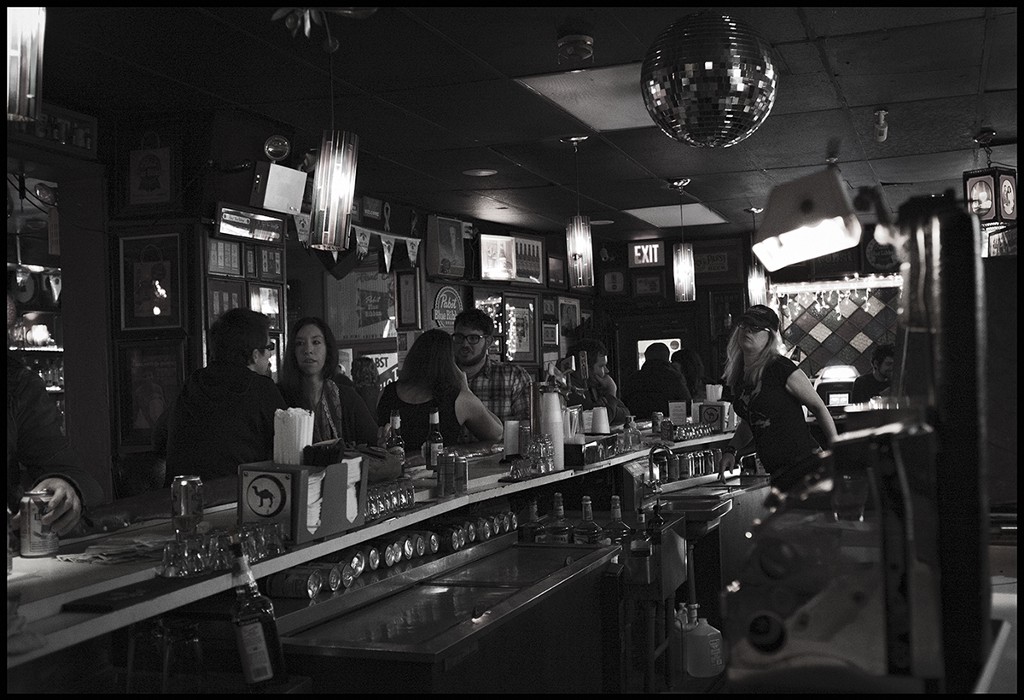
It’s here, the greatest working day of the year. That’s right, the calendar has once more come around to National Duck Out Of Work For A Drink Day at last! Be sure to take some time today to leave your job and slip away into the sweet embrace of liquor.
If you are somehow unfamiliar with this American celebration of skipping out of your office to sneak some alcohol during labor hours, it is a venerable tradition dating back many years. To observe, all you need to do is grab a friend from work and slip off to a nearby bar for a shot or two. Or a couple of mixed drinks. Or a shot and a beer and then maybe one more beer. Two shots and two beers. A few spritzers, even. Whatever you can get away with. And do not feel ashamed if you need to go by yourself. The point of National Duck Out Of Work For A Drink Day is the ducking out and the drinking.
Those of you who are new to the holiday may be expressing some doubts right now, so I will just reprint the proclamation from last year here to reassure you that it’s nice and legal.
WHEREAS work is long, boring and especially difficult to take during the summer months when you could be outside, particularly when you consider how awful winter has been lately and will be for the rest of our lives and you’re starting to realize summer is almost over, and
WHEREAS contemporary human existence is a mostly unrelenting series of trials and tribulations of varying degrees of unpleasantness, none of which means anything in the end, the only reasonable temporary solution that has yet been discovered for being alcohol, and
WHEREAS life is largely designed and directed by forces beyond your control and your lack of real agency may be the most frustrating thing about work, and
WHEREAS a national day of celebration in which colleagues sneak away from the office to nearby bar to have a few quick drinks to both alleviate their pain and briefly exercise some sort of power over their own time has been shown over the years to be one of the few bright spots in a calendar otherwise filled with soul-crushing ennui,
NOW, THEREFORE, I, Alex Balk, creator of a holiday designed to allow everyone to blow off just a few minutes of goddamned steam with a couple of shots or beers or maybe even a craft cocktail if that’s the kind of thing you’re into and you don’t mind dropping $17 on something that a $5 slug will have the same effect as, do hereby proclaim Tuesday, August 25th, as National Duck Out For A Drink Day throughout the United States of America,
URGING AND DIRECTING all within its borders to take a few moments at some point during the day to run out alone or with colleagues and enjoy the temporary relief alcohol has to offer, remembering especially that if you go to the bar during work, it’s like they’re paying you to drink.
DECLARED AND AFFIXED BY ME HERE ON THE INTERNET, LIKE AND SHARE ON FACEBOOK AND INSTAGRAM AND TWITTER OR WHATEVER IF YOU FEEL LIKE IT (SOCIAL IS PRETTY IMPORTANT THESE DAYS), IF YOU’RE SOMEONE WHO DOESN’T OR CAN’T DRINK I GUESS JUST SNEAK OUT AND HAVE A SODA TO STAY WITH THE SPIRIT OF THINGS, REMEMBER TO BRING MINTS SO YOU DON’T GET FIRED WHEN YOU GET BACK, THANKS FOR ENJOYING THIS HOLIDAY EVERYONE, IF YOU DO DRINK DON’T DRIVE, ETC.
See? Totally official. National Duck Out For A Drink Day comes but once a year. Be sure to make the most of it.
New York City, August 23, 2016

★★★★★ The morning sky was wholly cloudless. There was a fraction more haze on the air, but the coolness still held on. With an audible snap of a shutter, a man took a photo of a young woman in a jumper going by. An idling and unnecessary ice cream truck spilled exhaust into the mouth of a crosswalk, the only discomfort to be found anywhere for blocks. The full sun was eventually hot, but only hot enough to be a reminder that this was all somehow happening in August.
How Much Drinking Is Too Much Drinking?
Or is that even a thing?

Do we drink too much? It is a question currently stoking the fires of the perpetual take machine that is the Internet, and the latest source of fuel is a gendered variation on that question. The Billfold’s Ester Bloom summarizes the debate here:
Do “Successful” Women Drink Too Much?
Without wishing to register an opinion on the girls against boys aspect of the whole thing — because even I am not that stupid — I would like to say this: If you are worried that you are drinking too much, maybe you should ask yourself why you’re drinking. A very wise man once suggested some possible reasons for why we consume alcohol:
We’re depressed. We feel as if we haven’t succeeded in even the modest goals we’ve set for ourselves. We’re nervous. We over-analyze the most rudimentary aspects of life, imbuing each detail with imagined tragedy when the sheer facts of living are tragic enough. We feel awkward. We are sad and alone. We like the taste.
If any of those fit the bill then you are probably drinking for the right reasons. I mean, there may not actually be any wrong reasons for drinking. I guess it is something you have to take on an individual basis? Here are some further thoughts on alcohol’s benefits and why you might want to partake of them.
Again, what works best for you is what you should consider most, and if things are not working for you, when it comes to the drinking, then maybe you should find something else to help you muffle your own reality. There is a whole world of substances out there to help you stay somewhat removed from reality. Or non-substances, even! Some people swear by running! Those people are annoying freaks, but the point is there are plenty of things to do to keep life at a safe distance. You don’t have to drink. But if you do drink, and you enjoy it, by all means don’t guilt yourself into stopping. Don’t let anyone else make you feel bad about your ability to handle it. And make some time tomorrow for a very important holiday.
Being Frank
What Frank Ocean does and doesn’t divulge on his newest record
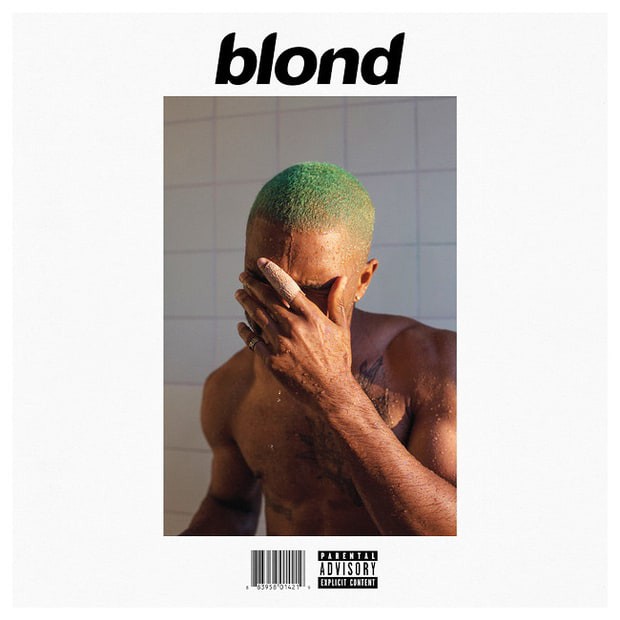
In 2012, a few days before Channel Orange’s digital drop, I remember my folks asking me why Frank Ocean’s sex life mattered. He’d just alluded to loving a dude in a long note on Tumblr. No one knew how that would affect his career at the time, and the whole thing felt a little bit crazy, but here we were talking about it at the dinner table: my parents, who didn’t do music, and me, the gay boy in training. We had just made it home from church, where we listened to a sermon to the tune of “casting out your demons.” I didn’t have any examples to call on. As far as I knew, dude was doing a new thing. Channel Orange sold over 600,000 copies, and then it went on to win the Grammy and Ocean dissolved into the air entirely.
What I should’ve said was that an allusion to queerness in the public eye wasn’t simply rare in Ocean’s genre — it didn’t exist at all. It’s not really something that mainstream black male artists do. And of course, I could’ve mentioned Little Richard’s occasional nods to camp, or Prince’s cultivated gender fluidity, and I could’ve mentioned Hendrix and I could’ve mentioned Whoever Else. But most of these guys took from a culture they weren’t much invested in, to say the least, on their quests to unbutton the flies of the opposite sex across the glove.
But Ocean found a way to adopt queerness for queerness’s sake. There was no obvious ulterior motive. It just felt like he needed to get something off his chest. There’s a line on Channel Orange’s “Forrest Gump” that feels like a case in point:
I know you Forrest
I know you wouldn’t hurt a beetle
But you’re so buff and so strong
I’m nervous Forrest
Black men are a lot of things on record, but they aren’t nervous. And yet here he was. And to another man, of all people. There’s a similar ode on Blond(e). Except now Ocean’s a grown-ass man. He knows better, if not more, about what he’s getting into:
I’ll be the boyfriend in your wet dreams tonight
Noses on a rail, little virgin wear the white
You cut your hair but you used to live a blonded life
You can’t really talk about Blond(e) without bringing at least a little attention to the rollout. A smooth four years passed between albums. It dropped on the heels of a whole other record, “Endless,” a visual album that’s basically a forty-minute set piece. First, there’s the obvious issue of the discrepancy in the record’s title, donning the ‘e’ in some places and dodging it in others. It could be a nod to the tug of the word’s femininity, and an aversion to that very same notion. It’s another riddle Ocean’s given us to solve. Blond(e)’s cover is its own beast, and the thought underlying its presentation is worth at least as much scrutiny as the record itself. But Ocean hasn’t given us a whole lot to go with here — you could fill a Reddit thread or nine with the underlying connotations of cars, cocaine, a lover with blonde—or blond—hair.

It’s not like Ocean has been silent between release dates. He showed up on just about everyone else’s albums. Immediately after the Pulse shootings, Ocean penned an open letter (noting, among other things, “We are all God’s children, I heard”). He wrote a screenplay for a TV show, called “Godspeed.” In the video for “Endless,” we watched him hammer a staircase. He teased us all on Twitter with the record’s release date, and not even under his own handle (he doesn’t have one), he had half the world bugging over a release date he himself never gave.
There are the incidental notes too. Beyoncé and Kendrick Lamar appear on Blond(e), but their roles are peripheral at best. Bon Iver hums in the background. Yung Lean and The Hollows’ Austin Feinstein streak across the same track, and André 3000 comes through for a literal minute to break the door down. Jonny Greenwood and James Blake fluttered their hands across the album. David Bowie, Elliot Smith, and the Beatles are listed in the credits, but Ocean doesn’t explain how or why they’re incorporated. They hide in song titles, and in phrases murmured offhand.
Ocean is a pretty private guy; he really only fucks with Tumblr. But Blond(e) is an extremely personal record, and we’ll be dissecting exactly just how much of himself he’s shared with us for some time. On “Good Guy,” as the track whispers in under a handful of chords, Ocean relays an anecdote from a sore date:
Here’s to our good guy, he hooked it up
Said if I was in NY I should look you up
I, first time I done saw you
You text nothing like you look
Here’s to the gay bar you took me to
Here’s when I realized you talk so much more than I do…
I know you don’t need me right now
And to you it’s just a late night out
On “Ivy,” Ocean riffs on surprise, and the unexpected allures of affection:
I thought that I was dreaming when you said you love me
The start of nothing
I had no chance to prepare
I couldn’t see you coming
That vulnerability kept taking me out throughout. This isn’t a radio record . For some artists, I’d expect it, yeah, but from guys who look like Frank Ocean—like me? And on the year’s most anticipated release? Nah.
In most camps, the quality of the music itself was never called into question. You and I didn’t for a second think that the release date was pushed because he couldn’t pull it off. Blond(e)’s got layers, it gives answers to questions that we weren’t asking before. It takes the notion of R&B and ‘black music’ and whatever we thought that meant and flips it on its head. The silences and breaks are maddeningly calculated. Some gaps bloom silently for one, two, three seconds, while others expand into flourishing arpeggios (there is a lot of guitar on the album). The drops, when they do come, are devastating. “Nights” in particular features at least one notable shift, in the middle of the track, at least a little bit reminiscent of Channel Orange’s “Pyramids.” The record is inscrutable in swathes. But you could probably also get laid to at least half of it too.

Much has been made out of his notes regarding the car imagery plastered on Ocean’s mixtape Nostalgia, Ultra, and then again in pockets of Channel Orange, and again in Boys Don’t Cry, a magazine Ocean released in conjunction with the records. It’s got poetry (a piece from Kanye West concerning McDonalds), an abundance of art (featuring men and women, naked and not), and cars and cars and cars. He alludes to the vehicles connoting a certain brand of masculinity. Ocean’s since claimed it could link to a deep subconcious straight-boy fantasy (“Consciously though,” he adds, “I don’t want straight. A little bent is good too”).
Except that he doesn’t much care to elaborate on that either. Or if he does, he’s having another conversation entirely. And maybe that’s the calling card of a really solid-product: we become at least as concerned with the guy underlying the tracks as the record itself. How could he make this? What’s going on his head? A fuck-ton, but Ocean knows exactly what to show us and what not to.
A woman who sounds a lot like a mother admonishes someone who sounds a lot like Ocean on the record’s fourth track. Her tone’s just as scolding as the other mother, on Channel Orange’s “Not Just Money”. This time, she encourages him to be himself, to stay away from the pot and the alcohol and the bad influences that would take him away from whoever that is. She tells him that he knows who she is. She tells him that he should listen. She taught him right. And yet, on the next song’s very first verse:
Hand me a towel I’m dirty dancing by myself
Gone off tabs of that acid
Form me a circle, watch my jagger
Might lose my jacket and hit a solo
The first time I heard this bit, I thought, Oh. This is where he grows up. That’s what the album’s about. Even if it means stepping away from whatever he’d grown up thinking he should be. What will never not be fascinating to me is how this dude from the Seventh Ward takes what is arguably the most homophobic genre on American airwaves and turns it on its head.
Blond(e) ends on a very different note from the one it begins on. We’re left with a dialogue from his younger brother, Ryan at eleven years old; he’s not all that much older now — and he’s fielding questions about the future from some kid. The kid asks Ryan about his earliest memories (speaking his first words) and the most amazing thing he’s ever seen (friendship). The conversation comes on the heels of a melody rising like something a little more akin to Radiohead’s Kid A than anything else, where Ocean notes that “now I’m making 400, 600, 800K momma, to stand on my feet”:
They paying me momma
I should be paying them
I should paying y’all honest to God
I’m just a guy I’m not a god
Sometimes I feel like I’m a god but I’m not a god
It’s a telling assertion. Across The Life of Pablo, Kanye flaunts his god-status, and on Chance the Rapper’s Coloring Book, he nods in deference to the Holy, and on Kendrick Lamar’s To Pimp a Butterfly, he returns again and again to the randomness/specificity of His will. These men stake their allegiances and their parallels and their trifles with the holy.
Ocean feels like God. But he knows that’s not. But knowing a thing isn’t true doesn’t evaporate the thought, and maybe this was Frank’s mission, what it is that he’s getting at — the space between labels and certainties and declarations. He’s shown us that there’s a space for that, too. It took him a while, but he’s found it. The result is the sound of the past four years, of the waiting for this thing — it’s pretty clear that Ocean’s been waiting with us, too. And whether or not you concede that the album was one worth waiting for (I do), it’s certainly one worth living with.
When I heard the record came out, I listened to it all the way through. Then I left my place for tacos. I didn’t listen to shit on the way there; I felt a little dizzy. Then, back in the car, I parked at a gas station, and tried the record again, and then again the next morning, and then I called my mom. I told her something amazing had happened, that I’d finally gotten her answer — four years later. I asked if she remembered (she didn’t). But she still humored me, she asked why, and from who, and I told her Frank told me, I said I think he’s figured it out.
Bryan Washington divides his time between Houston and New Orleans. He is working on a collection of short stories.

